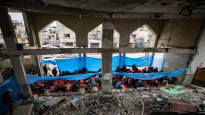Attempts have been made to negotiate a new ceasefire for a long time. At the same time, the residents of Gaza are threatened by a worsening food shortage in addition to the war.
Israel has sent the head of the Mossad intelligence service to Paris for ceasefire negotiations David Barnean. One of Israel’s demands is to release the remaining hostages held by the extremist organization Hamas.
The pressure to achieve a ceasefire has increased after the war in Gaza has continued for more than four months. The families of the hostages are preparing a large demonstration for Saturday evening to increase pressure on the Israeli representatives participating in the Paris negotiations.
The United States, Egypt and the Persian Gulf country Qatar have participated in the ceasefire talks in the past. This week, the representative of the United States has met with representatives of Israel in Tel Aviv and in Cairo with parties connected to the leadership of Hamas.
According to a Hamas source, there is a plan for a six-week break from the war, reports the news agency AFP. During that time, Israel would release 200–300 Palestinian prisoners and Hamas would release 35–40 hostages. Hamas kidnapped 250 people in connection with the terrorist attacks on October 7, of which approximately 100 are known to be still alive in Hamas’ possession.
The residents of Gaza are threatened with starvation
Israel has continued its heavy bombing of Gaza. During the night before Saturday, almost a hundred people died, according to the health authorities of Gaza, which is administered by Hamas. Almost 30,000 people have already died as a result of the war since the beginning of October, say the Gaza authorities.
The UN warns that the risk of famine in Gaza is increasing. The worst situation is obviously in the northern parts of Gaza. Only a fraction of aid shipments have arrived compared to the time before the war.
Prime Minister of Israel Benjamin Netanyahu the other day presented his own plan for the administration of Gaza after the war. In Israel’s plan, Hamas would have no role in Gaza, and Israel would continue to retain the right to military operations in the Palestinian-occupied area.
Israel’s most important supporter, the United States, has taken a cautious approach to Netanyahu’s plans in its initial reactions.
The Palestinian Authority completely rejected Netanyahu’s plan yesterday, Friday.
Sources: AFP, AP
